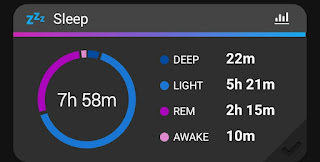If you have ever experienced jet lag, you know that it is a real thing and that memory loss, imbalance, fatigue, and brain fog are all very real, but did you know you can experience jet lag without even getting on a jet?
If you are following my Facebook page, I am sorry 🙂 But you have probably seen my posts from my Garmin watch about how close to 8 hours of sleep I am getting each night. Some nights I am getting 8 exactly. On other nights I am within 5-10 minutes of that goal.
Jet lag is a condition where your internal clock is out of sync with the external clock. One hour off might not seem significant, but it can be. When your internal clock is out of sync you become mentally dull, irritable, and clumsy, and you may sleep excessively, or not at all.
Something as simple as daylight savings time can have the same effect as if everyone took a plane one-time zone east. Don’t think so? Car accidents increase by 10% the day after clocks are set forward in the spring!
Your suprachiasmatic nucleus (SCN because we are never typing that again) is a cluster of brain cells located at the base of the brain near where the two main nerves from the eyes intersect. The role of the SCN is to control our internal circadian rhythms and is primarily sensitive to light (or lack thereof). Naturally, and by design, when the sun goes down, you feel more tired, and when the sun is up you have more energy. Other environmental zeitgebers (yes that is a real word..it is German for “time givers”) can keep you up longer than you may intend.
When dark, your pineal gland produces melatonin which is a hormone that stimulates sleep. Melatonin is a synthesized form of tryptophan which is the hormone in turkey that makes you so sleepy on Thanksgiving. Simply put, light and other zeitgebers can manipulate your natural circadian rhythm and leave you exposed to problems with sleep, weight loss, and mental sharpness. Simple 100-watt light bulbs push and pull at the hands of your internal body clock.
Resetting and maintaining a healthy circadian rhythm is vital to health and I have managed to get so dialed in, that I jump out of bed ready to poop (I know, I know, TMI..but it is important to your health as well), eat, and start my day every day at almost 6 am on the nose.
What can be done to improve and reset your circadian rhythm?
- Have a routine. I go to bed and wake up at the same time every day. Now I know that isn’t always practical but like anything else being mostly consistent works here.
- Exercise. Sick of hearing about this yet? However, when I exercise in the morning, I always feel most productive after. Even when I walk in the evening, I come home and accomplish more than I otherwise would have, had I just watched TV.
- Avoid alcohol and caffeine. Especially in the nighttime. I do not drink alcohol unless Josh Allen is firing bombs and while I do drink plenty of Diet Coke it is never after 6 pm.
- Screentime!!… Looking at your phone screen or any screen restricts your production of melatonin and I believe might steal your soul. I joke…kind of. Descartes thought that the seat of the human soul (rational thought) was the pineal gland, and shining a light into your eyes directly affects your pineal gland (the one that produces melatonin). Turn off the TV and your phone 30 minutes before bed and just watch how much better you sleep, and you might be able to keep your soul 🙂
- Avoid Naps Naps can be a great way to get reset and refocused. I recommend them. However, if they go over an hour, they can actually hurt your circadian rhythm. Nap if you must, but keep it under 30 minutes. I believe that if you can manage to do the first 4 steps, you will be so well-rested that you won’t need naps anyway.


